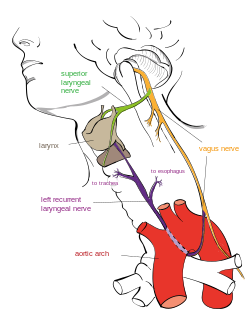Polyvagal theory
| Tell me about your mother Psychology |
| For our next session... |
| Popping into your mind |
Polyvagal theory is an unproven neuroscientific and psychological theory focused on the vagus nerve's role in social psychology. First developed by Stephen Porges![]() in the 1990s, polyvagal theory purports to explain how the vagus nerve is involved in emotional regulation, the fear response, and social connection. It is not endorsed and often criticized by mainstream psychologists or neuroscientists and may be found in the company of other pseudoscientific theories.[citation needed]
in the 1990s, polyvagal theory purports to explain how the vagus nerve is involved in emotional regulation, the fear response, and social connection. It is not endorsed and often criticized by mainstream psychologists or neuroscientists and may be found in the company of other pseudoscientific theories.[citation needed]
Theory[edit]
There are three major tenets of polyvagal theory:
- Hierarchy, how the autonomic nervous system reacts in three reaction patterns, which are activated in a specific order
- Neuroception, a cognition without awareness, triggered by a stimulus such as danger
- Co-regulation, the need to feel safe enough to allow oneself to be in relationships
According to polyvagal theory, there are essentially three pillars of the autonomic nervous system. In the traditional view, the sympathetic and the parasympathetic nervous systems activate the "fight-or-flight", mobilization response and the "rest-and-digest", immobilization response, respectively. Polyvagal theory elaborates by adding a third, social response. It splits the parasympathetic nervous system into two parts: the ventral vagal system and the dorsal vagal system. The dorsal vagal system concerns the relaxation response, but the ventral vagal system supports social engagement. The ventral vagal system allows one to feel safe, and thus open to interaction.
As may be apparent, polyvagal theory thus is a theory of social neuroscience that places great emphasis on how socialization influences emotional regulation. It comes up often in some branches of trauma studies.
A major part of polyvagal theory is how it interprets the "frozen" response which many experiences when they are afraid. According to polyvagal theory, this response is caused by a conflict between the mobilization and immobilization responses without feeling safe.
Criticism[edit]
Polyvagal theory has been criticized for inaccuracies in both its neurological and evolutionary claims.[citation needed] It also may not be falsifiable, and thus pseudoscientific.
See also[edit]
- Éiriú Eolas – A pseudoscientific "breathing and meditation program" which draws on the polyvagal theory.

